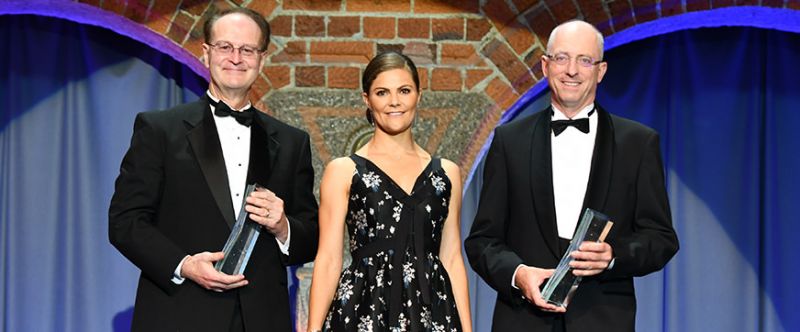Rittmann and van Loosdrecht Win 2018 Stockholm Water Prize for Pioneering Wastewater Treatment
Published on by Water Network Research, Official research team of The Water Network in Academic
Professors Bruce Rittmann and Mark van Loosdrecht received the 2018 Stockholm Water Prize, for microbiological research and innovations that have revolutionized water and wastewater treatment.
The prize was presented to them by H.R.H. Crown Princess Victoria of Sweden, at a ceremony in Stockholm City Hall during World Water Week.
By Kanika Thakar

Image Source: SIWI
When congratulating the laureates, H.R.H Crown Princess Victoria, said: “There is nothing more hope-inspiring than to learn about new and innovative ways to conquer our most fundamental challenges. Like freshwater, the creativity of the human mind is a most valuable natural resource; holding the keys to a just and healthy future for us all.”
On receiving the Prize, the laureates thanked their universities and the Nominating Committee, with Professor van Loosdrecht adding: “I would also like to thank all the PhD students who I have worked together with developing this technology – without them, not much would have come out of my hands!”
Professor Bruce Rittmann remarked that: “I view honours like the Stockholm Water Prize not as a ´happy ending´, but as a foundation to contribute in more and better ways. More than Mark and me, the true winner today should be Environmental Biotechnology, our powerful partnership with microorganisms. Human society needs the power of the human-microbe partnership. It can make our environment cleaner, generate truly renewable resources, and improve our health.”
The research of Bruce Rittmann from the USA and Mark van Loosdrecht from the Netherlands has contributed to the understanding of how microorganisms can transform organic pollutants to something of value to humans and the environment. This remarkable scientific achievement has led to the implementation across the globe of technologies which make it possible to remove harmful contaminants from water, cut wastewater treatment costs, reduce energy consumption, and even recover chemicals and nutrients for recycling.
Professor Kartik Chandran, member of the Stockholm Water Prize Nominating Committee, said: “Professors Rittmann and van Loosdrecht have an exceptional and repeated record of converting pressing societal and environmental challenges all the way from basic research to proven and commercially viable opportunities for municipalities, agriculture and industry around the world.”
In addition to their research efforts, both laureates have trained numerous engineers, scientists and academics who carry on and expand their legacy. Environmental biotechnology is now a rapidly growing field, of relevance to for example energy, materials, food and human health.
“Professors Rittmann and van Loosdrecht are at the forefront of the environmental biotechnology revolution. I am deeply impressed by how they have converted trailblazing theories into current practice, making water treatment more affordable by borrowing solutions from nature,” said SIWI’s Executive Director Torgny Holmgren.
More about Professor Rittmann
Professor Bruce Rittmann has written over 650 peer-reviewed scientific papers. Together with Professor Perry McCarty (the 2007 Stockholm Water Prize Laureate), he is also the author of the textbook Environmental Biotechnology: Principles and Applications.
Professor Rittmann has chaired the Program Committee of the Leading Edge Technology Conference of the International Water Association, where he has worked together with Professor van Loosdrecht. The membrane biofilm reactor (MBfR), a technology that Dr. Rittmann invented, uses naturally occurring microorganisms to remove contaminants such as perchlorate and tricloroethene from water, and has been commercialized.
Dr. Rittmann has received many accolades during his career. These include being named a fellow of the International Water Association, National Academy of Inventors, and American Association for the Advancement of Science; and he is a member of the U.S. National Academy of Engineering and a Distinguished Member of the American Society of Civil Engineers.
More about Professor van Loosdrecht
Professor Mark van Loosdrecht’s research has led to the quite widely used Anammox and Nereda technologies for wastewater treatment. The Anammox process is a resource efficient way to remove nitrogen from wastewater. In industries it is used after anaerobic wastewater treatment while in municipal wastewater treatment it is used in combination with sludge digestion. In both cases this results in an energy producing treatment process.
The Nereda technology is based on granulation of bacteria, which allows a simpler and cheaper municipal wastewater treatment process. A Nereda plant can be built on a smaller patch of land (>60 per cent less area need) and uses up to 50 per cent less energy than conventional methods. Recovery of high performance biopolymers from the ‘waste’ sludge will contribute to a future more circular economy.
Professor van Loosdrecht has been awarded several prizes, including the 2014 Spinoza Prize and the 2012 Lee Kuan Yew Prize. He is chief editor of the scientific journal Water Research and a member of the Royal Netherlands Academy of Arts and Sciences and of the Dutch and USA National Academies of Sciences.
Source: SIWI
Media
Taxonomy
- Treatment
- Reclaimed Wastewater
- Treatment Methods
- Industrial Wastewater Treatment
- Industrial Water Treatment
- Wastewater Treatment
- Industrial Water Treatment
- Industrial Water Reuse
- Industrial Water Managment
- water treatment
- Water & Wastewater
- Water and Wastewater Manager